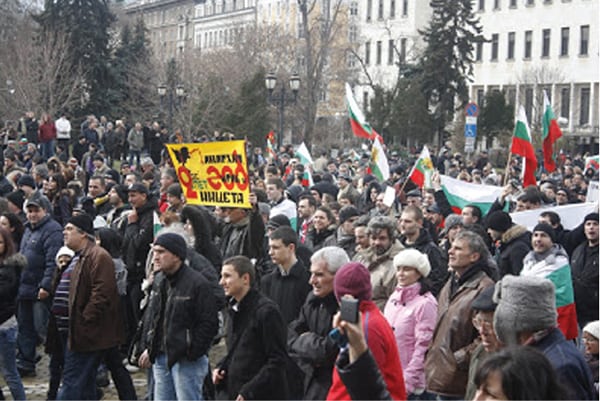Bulgarian PM Quits Over Power Price Protests
Protests in more than 20 cities by tens of thousands of Bulgarians over January electricity bills that averaged more than €100 ($130) forced the country’s prime minister, Boyko Borissov, and his center-right government to resign in mid-February.
Bulgarians, who have the lowest average salary in the European Union (EU)—about €387 ($504) a month—reportedly accused three foreign-owned energy companies of what they said were unreasonably high electricity bills. Brushing aside government platitudes that January was an exceptionally frigid month, they showed outrage at reports that the companies pulled in windfall profits. According to some media reports, Bulgarians alleged corruption among Czech firms CEZ and Energo-Pro and Austria’s EVN and the government. The three firms control the country’s power distribution market, which was divided into three regions when the country privatized its network a decade ago.
The European Commission (EC) in January had referred Bulgaria—which joined the EU in 2007 but has been criticized for shortcomings that remain regarding corruption and organized crime—to the European Court of Justice for failing to fully abide by EU energy market rules.
 |
| 2. A power protest. Mass protests by Bulgarians over surging January electricity bills forced the prime minister, Boyko Borissov, and his center-right government to resign in mid-February. Bulgarians allege corruption between the government and three utilities that control the distribution network. Courtesy: Blisses |
An EU country report published last year finds two issues with Bulgaria’s recent power sector reforms. First, liberalization of the nation’s wholesale market is incomplete. “There are quotas, there is a dominant player and there are no free prices,” Marlene Holzner, spokesperson for EU Energy Commissioner Günther Oettinger told the EU’s web-based media portal Euractiv in February. Second, despite recommendations by the EC, the country’s electricity regulator is not independent. “In Bulgaria there were regulated prices for small and medium enterprises and also for end users. The Commissions’ position was that Bulgaria should have market prices, but also regulated prices for very vulnerable consumers,” it said.
Former Prime Minister Borissov had sought to quell the chaotic protests in February by announcing Czech utility CEZ would be stripped of its license. Though this failed to diffuse public tensions and calm protests, he also pledged to cut power prices by 8% starting March 1. Czech Prime Minister Petr Necas, meanwhile, reacted to Borissov’s statements by urging the country to keep its international obligations under European law, including those regarding foreign investment protection.
Bulgarian President Rosen Plevneliev called for an early election on May 12 to reduce the fallout from the political crisis that he said could undermine the country’s economic stability.
—Sonal Patel is POWER’s senior writer.